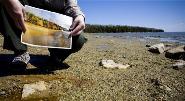December 18, 2012
The Milwaukee Common Council has had enough of the Chicago River and the threat it poses to all of the Great Lakes. The council passed a unanimous resolution Tuesday that calls for separating the Chicago River system from the Asian carp-infested Mississippi River basin, and the leader of a group representing the region’s mayors said he expects other Great Lakes cities to follow suit.
“I’m quite confident they will, because I think this is the right thing to do,” said David Ullrich, executive director of the Great Lakes and St. Lawrence Cities Initiative, a group founded by former Chicago Mayor Richard M. Daley that represents dozens of the region’s mayors.
The Great Lakes and Mississippi basins were artificially connected more than a century ago with the construction of the Chica go canal system. Now those canals are recognized as a prime pathway for unwanted species to invade fresh waters.
“Preventing invasive carp from entering the Great Lakes and St. Lawrence ecosystem needs to be approached with the greatest sense of urgency by all those responsible for dealing with this matter,” the Milwaukee Common Council resolution states.
” . . . Physical separation is the most effective way to keep invasive carp from entering Lake Michigan through the Chicago Area Waterway System, and such barriers would also prevent the movement of many other invasive species from one basin to the other.”
The problems posed by the Chicago River and its canal system were detailed in a Journal Sentinel series published earlier this week.
The U.S. Army Corps of Engineers is in the midst of a multiyear study evaluating ways to stanch the flow of unwanted species between the two basins. Impatient for the results of that study, earlier this year the Great Lakes Commission and the Cities Initiative funded their own $2 million study looking into what it would take to restore the divide destroyed with the opening of the Chicago Sanitary and Ship Canal.
The study puts forth three scenarios for accomplishing this. The most promising appears to be a four-barrier system that would block access to all five Chicago area waterways that provide an artificial connection between Lake Michigan and the Mississippi. The study says the project could take more than a decade and cost at least $4 billion, but argues that the cost of doing nothing could be far higher.
That’s because the Army Corps has identified 39 species poised to use the canal system to invade either Lake Michigan from the Mississippi, or vice versa. These unwanted species could wreak havoc on the lakes’ multibillion dollar fishing industry, as well as the South’s aquaculture operations. It is a national problem; the federal government has said if pipe-clogging Great Lakes invasive mussels make their way into the Columbia River’s hydroelectric dams, they could do more than a quarter-billion dollars in damage per year.
“Restoring the natural divide and separating the Great Lakes and Mississippi basins in the Chicago water system can be done,” Milwaukee Mayor Tom Barrett said in an interview last week.
“There are costs to doing it, and there are costs to not doing it, and I think it’s important to focus on the cost of not taking action.”
Barrett is chairman of the Cities Initiative.
“We wanted to be first in something that we hope everybody else will sign on to, including Chicago,” said Ald. Nik Kovac, co-sponsor of the resolution.
The plan calls for a system of barriers that would still allow for cargo to move on the canals as well has handle Chicago storm-water and wastewater problems.
Chicago Mayor Rahm Emanuel has been quiet on the issue recently, though he spoke favorably of the study when it was released earlier this year.
“I am very interested in solutions that improve flood control, transportation and water quality in the Chicago River while protecting the Great Lakes,” he said in a statement. “We are eager to work with leaders around the region to plan solutions that work for Chicago and also stop invasive species.”
Don Walker of the Journal Sentinel staff contributed to this report.

